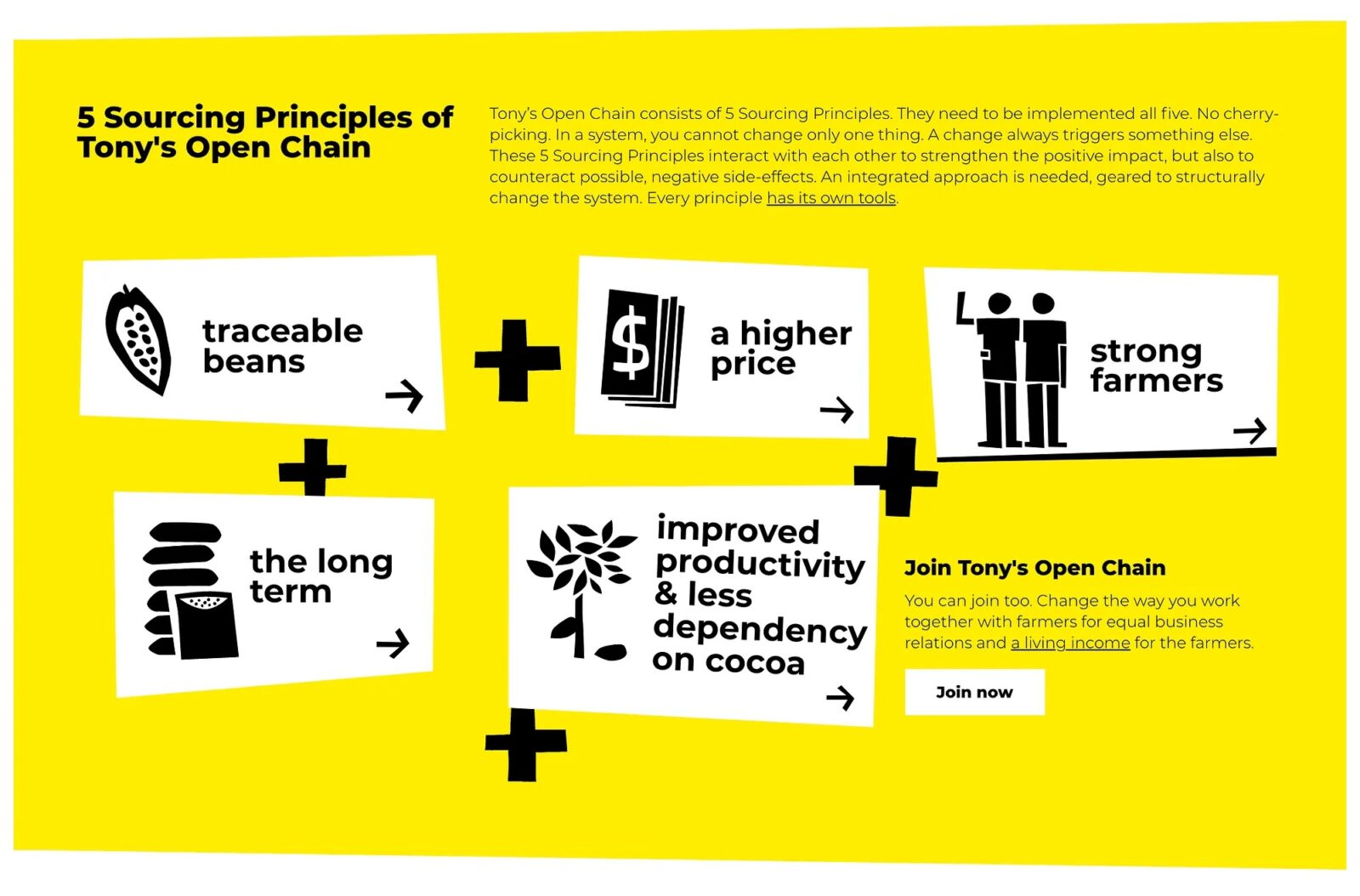If you haven’t actively looked for child labour issues, you won’t find it, and if you haven’t found it, you can’t fix it.
Douglas Lamont
CEO, Tony's Chocolonely
Opinion
Global Child Forum
PUBLISHED: OCTOBER, 2025
Douglas Lamont, CEO of Tony’s Chocolonely since 2022 and long-time advocate for business as a force for good, has built his career on proving that companies can thrive while putting people and planet first. From his decade leading innocent drinks to co-chairing the Better Business Act, his focus has consistently been on embedding purpose into profit.
In this interview, he shares how Tony’s is tackling illegal child labour in cocoa through its pioneering 5 Sourcing Principles, child labour monitoring systems, and mission-locked governance, and why these lessons matter far beyond chocolate for any business sourcing from vulnerable communities.
Tony’s Chocolonely was founded in 2005 by journalist Teun van de Keuken to challenge the use of illegal child labour in cocoa.
Almost 20 years later, what single change in the way you work with farmers has had the biggest direct impact on reducing child labour, and what could other industries learn from it?
Douglas Lamont: The most impactful change we’ve made was in 2014 when we started implementing Tony’s 5 Sourcing Principles into our cocoa supply chain. These principles are our tried-and-true solution to ending exploitation in the cocoa industry. Together they enable farmers to earn a living income, end child labour and deforestation.
These include:

Social traceability—knowing under what conditions our cocoa beans are sourced—is a core part of Tony’s 5 Sourcing Principles.
Since 2017, we’ve implemented the Child Labour Monitoring and Remediation System (CLMRS) to identify and remediate cases of child labour, and to prevent future cases by raising awareness in cocoa-growing communities. Our partner cooperatives are in the driver’s seat, taking ownership of the system’s effectiveness, with support from Tony’s Open Chain—our global initiative that invites other cocoa-using companies to become Mission Allies and source cocoa through our principles. Through Tony’s Open Chain, CLMRS is being scaled across more supply chains.
And we’re seeing results. In the 2023/24 season, child labour prevalence rates dropped from 4.4% to 3.9% at long-term partner cooperatives, significantly lower than the industry average of around 50%.
Implementing the 5 Sourcing Principles is a business model that builds resilience, dignity and sustainability. Industries sourcing from vulnerable communities should move away from transactional relationships to transformational ones. Long-term commitments, transparency and fair pricing can break cycles of exploitation.
From your experience at Tony’s, what are the essential ingredients of a child labour monitoring and remediation system that actually works for children and families?
DL: At Tony’s Open Chain, we’ve learned that for CLMRS to truly benefit children and families, it must be deeply rooted in the realities of the communities it serves. The most effective systems are those developed in close collaboration with local communities—only then can they be truly impactful.
When cases of child labour are found, the response goes beyond removing the child from work. It includes support for education, alternative incomes for families, and follow-up to prevent recurrence. Farmer training, awareness raising and ensuring that external labour support is available are essential, making prevention part of everyday practice.
CLMRS requires sustained investment in livelihoods, education, and community resilience to work. In 23/24, 98% of farmer households who source their cocoa to Tony’s Open Chain are covered by CLMRS and we’re working towards 100%. CLMRS is not a slap-on solution. It takes time, resources, and a willingness to engage deeply with communities.
If you haven’t actively looked for child labour issues, you won’t find it, and if you haven’t found it, you can’t fix it.
Douglas Lamont
CEO, Tony's Chocolonely
When new partners join your collaborative sourcing programme, what common gaps or misunderstandings do they have about child labour in their own supply chains?
DL: One of the most common gaps we see is a misunderstanding of what child labour actually looks like in cocoa-growing communities. Many assume that if they haven’t received formal reports, it means child labour isn’t present in their supply chain. But the reality is that if you haven’t actively looked for it, you won’t find it, and if you haven’t found it, you can’t fix it.
Child labour is often hidden. Families may not report it due to fear, stigma, or simply because it’s not seen as necessary. That’s why proactive, community-led monitoring is essential. Regular visits from trained facilitators help in building trust and creating safe spaces for open conversations. We work with them because resolving child labour is not a ‘them’ problem, it is an ‘us’ problem. And lasting change can only happen when we face it together.
Another common misunderstanding is underestimating the role that poverty plays in driving child labour. Without earning a living income, many families rely on their children to contribute to farm work in ways that are often hazardous or interfere with education. By earning a living income, cocoa farmers can hire external labour as their children go to school.
Addressing child labour requires a shift in how we source cocoa and how we invest in long-term change. Beyond Tony’s 5 Sourcing Principles, it’s essential to invest in strong infrastructure. If cocoa farmers earn a living income but there are no schools for their children to attend, the risk of child labour remains high.
Tony's Chocolonely's Manifesto video
How can boards keep child labour prevention at the heart of decision-making even under pressure to cut costs or speed up delivery, and can you share an example of how Tony’s has done this?
DL: At Tony’s, our commitment to ending exploitation in the cocoa industry – including child labour – isn’t just a priority, it’s locked into our business model. Through Tony’s Mission Lock, we’ve legally embedded our mission into the company’s articles of association. This means that even under commercial pressure or a shift in shareholders, our mission cannot be compromised.
Tony’s Mission Lock is an independent legal structure that holds a golden share – a non-economic stake in the company – giving it the power to block any changes to mission-related articles, including the definition of our mission and our 5 Sourcing Principles. To reinforce this, we have three Mission Guardians active at any given time. These independent advisors ensure that every major decision aligns with our mission, holding the board accountable and keeping our values front and centre.
By locking our mission into our governance structure, we’ve made it non-negotiable, ensuring that child labour prevention remains at the heart of every decision, no matter the pressure.
The ESRS now requires companies to report on human rights impacts, including child labour. What is the smartest way for leaders to start this work, so their reporting is credible and results in real improvements on the ground?
DL: It all starts with traceability. Both the physical traceability of raw materials, and also social traceability: understanding the conditions under which they’re produced. Without knowing where your cocoa comes from and how it’s grown, you can’t take meaningful responsibility for human rights impacts like child labour.
Once you have that visibility, the next step is to put a monitoring and remediation system in place. CLMRS allows us to proactively identify and address cases, working directly with communities to ensure solutions are effective and realistic.
From there, companies need to move toward transparent reporting. That means setting clear non-financial KPIs, such as child labour prevalence rates, and having them audited by a credible, external party. This builds trust and ensures that reporting reflects real conditions on the ground, not just policy statements.

Industries sourcing from vulnerable communities should move away from transactional relationships to transformational ones.
Douglas Lamont
CEO, Tony Chocolonely
How do you ensure the higher prices you pay farmers directly improve children’s lives, and how do you explain that investment to stakeholders focused on short-term profit?
DL: Paying a higher price for cocoa is one part of the solution, but it only works when combined with all of Tony’s 5 Sourcing Principles. Together, they work to support farmers in increasing productivity, building long-term relationships, and enabling a living income. When cocoa farmers have a stable and sufficient income, they can hire additional labour, invest in their farms, and send their children to school instead of relying on them for work. More income means more opportunities and fewer children engaged in child labour.
For stakeholders focused on short-term profit, we frame this as smart risk management. It is a strategic investment which supports farmers with fair pricing, creating a more stable, transparent supply chain. This in turn reduces long-term risks and builds trust with consumers, partners and regulators. It’s not about sacrificing profit but building a business that is resilient, future-proof and aligned with growing expectations around ethical sourcing.
What one irreversible change over the next five years would most accelerate the end of illegal child labour in cocoa, and what personal legacy would you most like to leave through that change?
DL: The one irreversible change is for living income to become the industry standard, not the exception. But this can’t happen in isolation. Paying a higher price only works when it’s part of a broader, systemic approach like the one embedded in Tony’s 5 Sourcing Principles. That’s why we’re calling on more companies to join us as Mission Allies through Tony’s Open Chain. Because real, lasting change in the cocoa industry can only happen when we collaborate.
But this change needs structural accountability, which is why it’s fundamental to embed ethical sourcing into business models, governance, and reporting frameworks. It’s not enough to say that we care, but we need to show that it is profitable and scalable.
Inspiring wider industry change by proving that a more holistic approach that supports the farmer and the long-term sustainability of cocoa production is not just the right thing to do, but the smart thing to do to enable you to successfully and profitably scale. That is a legacy I would be proud of.
You have spoken about purpose guiding every decision and the importance of not turning away from hard truths. How did your own journey lead you to this issue, and what keeps your commitment alive when challenges arise?
DL: A purpose-led approach to business became part of my DNA at an early age as I watched my parents, who were entrepreneurs, build a successful company with a very human and employee-focused approach. As the extent of the climate crisis emerged in the early 2000’s it created in my mind a sense of personal commitment to both planet and people. That led me to the inspiring environment at Innocent Drinks and then 16 years later to Tony’s Chocolonely. I like tough challenges, and I like breaking new ground – showing that you can deliver for all stakeholders in the value chain, whatever the size of the company is, something that drives me at my core and allows me to be resilient in what is far from a straightforward path on a day-to-day basis.
Take Action on Child Rights in Your Supply Chain
See how your company measures up. Global Child Forum, in collaboration with the LEGO Group, has launched the Corporate Playbook: Embedding Children’s Rights in ESRS Reporting to support you in strengthening your supply chain and uphold children’s rights in business.
To the Corporate PlaybookImage credits